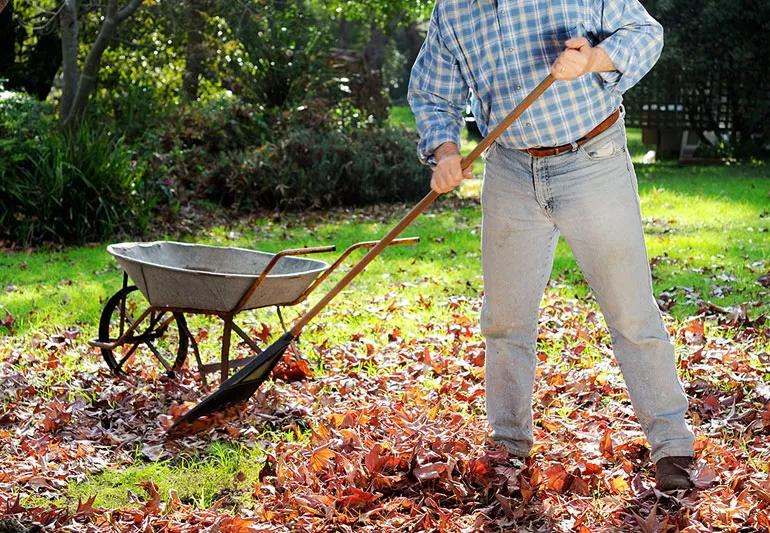The warning signs of trouble and how to prevent it

The fall season usually means lots of leaf-raking, tree-trimming and gutter-cleaning.
Advertisement
Cleveland Clinic is a non-profit academic medical center. Advertising on our site helps support our mission. We do not endorse non-Cleveland Clinic products or services. Policy
While it’s known that shoveling snow can put you at risk for heart attack, cardiologist Nicholas Ruthmann, MD, says it’s just as important to be careful during your fall clean-up too — particularly if you’re older or have heart disease.
If you’re not used to regular exercise or aren’t in shape, you can also be more likely to suffer a heart attack if you don’t take the right precautions.
It may be a simple task, but raking leaves is one of the autumn chores that can have the biggest impact on your heart, Dr. Ruthmann says. In fact, it’s considered to be aerobic exercise because of all the twisting and bending involved.
Clearing debris and trimming trees and bushes can really get your heart pumping, too.
“This kind of yard work can be particularly hard on your heart for many reasons,” he says.
First, raking leaves can be deceptively challenging. “Particularly if leaves are wet, they can actually be very heavy, making raking leaves as physically rigorous in some cases as shoveling snow,” he says.
Second, a large amount of exertion too quickly can trigger a heart attack — especially in the cold weather. This is because your arteries constrict, which can drive up your blood pressure. This puts pressure on your heart.
Advertisement
And if you’ve been more sedentary in recent or colder months, it can be even riskier. That’s yet another reason to stay active all year long, Dr. Ruthmann adds.
“Yard work is a workout. And like starting any new workout, you want to start slowly. But people tend to just jump right into yard work and try to tackle it all at once. That’s a bit like going from your couch to running a marathon,” he says. “If you aren’t super active year round, suddenly piling on a lot of yard work can be a jolt to your system.”
Doing any physical activity too quickly can cause health risks — especially on your heart, he adds.
For all these reasons, Dr. Ruthmann recommends easing into the work and paying attention to your pace once you get going.
“Of course, we want you to be active, we want you to exercise. And we want your yards to look good, too!” he says. “But we advise you start slowly and don’t overexert or strain yourself.”
Like with any physical activity, Dr. Ruthmann suggests warming up before you start (Again, it’s especially true if you have a history of heart disease, are older or aren’t physically active). Also remember to drink plenty of water and take frequent breaks.
Your body will let you know if you’re doing too much, but Dr. Ruthmann says we often ignore those messages.
“It’s important to pay attention to what your body is telling you. If you feel any aches or pains, stop.” he says. “Know the signs of a heart attack. And it’s important to note there are different signs for men and women. Be aware of the symptoms and listen to your body.”
Once you’re working, be on the lookout for any warning signs of trouble, such as:
Dr. Ruthmann also says it’s important to let a family member know when you’re doing yard work, particularly if you live alone, so they can check in on you.
“Of course, if you experience any signs or symptoms of heart attack, do not hesitate and call 9-1-1 right away,” Dr. Ruthmann says.
Advertisement
Learn more about our editorial process.
Advertisement

Squats are foundational for building strength in your legs, glutes, quads and core muscles

A consistent walking program is an effective way to drop pounds and lose body fat

You can improve your athletic performance over time by breaking up your workout regimen into focused cycles

Shoulder rolls, hamstring stretches and calf exercises can all improve flexibility and endurance

Lower-intensity workouts can deliver high-quality health and fitness results

Incremental changes in your exercise routine can improve your strength and endurance over time

Understanding heart rate zones can help you tailor your workout to reach your goals

Increase the size of your muscles by bulking up on protein and focusing on slow, intense movements with progressive overloading

Wearing a scarf, adjusting your outdoor activities and following your asthma treatment plan can help limit breathing problems

Your diet in the weeks, days and hours ahead of your race can power you to the finish line

When someone guilt trips you, they’re using emotionally manipulative behavior to try to get you to act a certain way